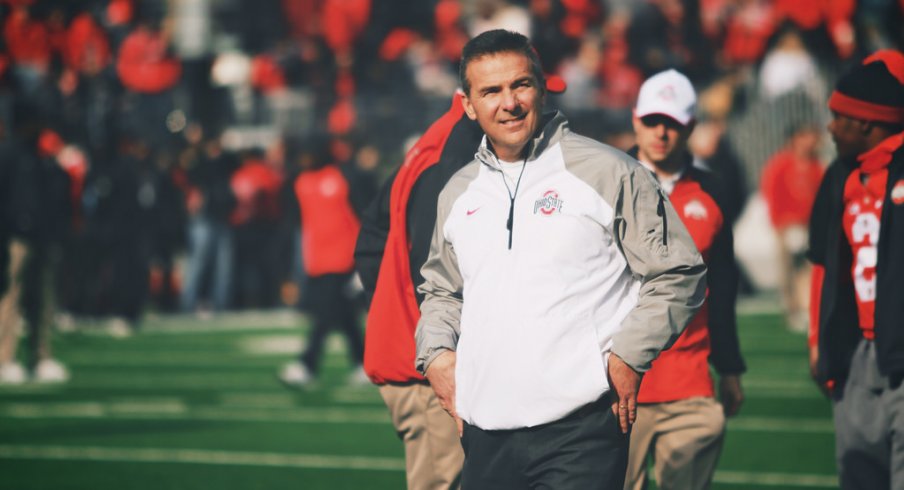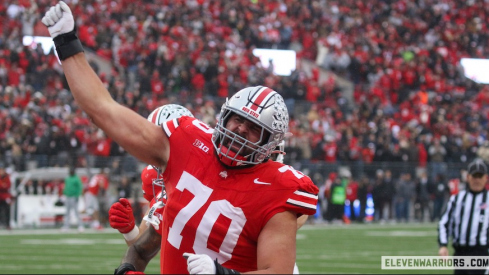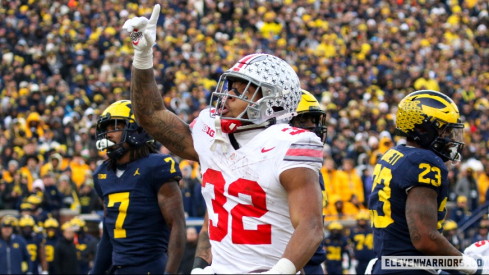Urban Meyer knows he carries clout as one of the best college football coaches in America. When he talks, people listen. When he shows his face anywhere from a local charity event in Sandusky, Ohio, to a hot vacation spot with his family, people notice. They take stock in knowing he is there.
That's part of the celebrity that comes with being Ohio State's head football coach, a job that pays him $6.5 million a year.
So why did Meyer openly express his distaste for a few NCAA regulations Wednesday before speaking on yet another top-5 recruiting class? Because he can, and he knows the powers that be are paying attention.
"I don't want to speak for (Ohio State Vice President and Director of Athletics) Gene Smith, but I speak for our coaching staff," Meyer said, "we feel very strongly about strong regulation and keeping the recruiting calendar as is."
Meyer is against an early signing period in college football, another stance he brought up unprovoked Wednesday. His thought sits in the best interest of teenagers preparing to make the biggest decision of their lives.
"You're moving it just forward and forward, what if a kid wants to change his mind?" Meyer said. "He wants to change his mind because of coaching changes or other circumstances, the player should be allowed to change his mind. Once again, take it out of the minds of a 50-year-old and put it in the minds of a 16-17-year-old."
Meyer feels the need to flip the script and see it through the tunnel vision of young people that might not understand the ramifications of things until long after they complete.
“So regulation is big. Beef up these NCAA—with all the money made from the College Football Playoff and Final Fours and all those type of things—beef up the enforcement staffs and keep it a level playing field and also, more importantly in all that, not change the lives of the young people.”– Urban Meyer
Meyer's status as Ohio State's head football coach holds significant weight around the country. He's built arguably the most powerful program in the Midwest, winning the Big Ten and national championships in 2014.
The season marked the first time a playoff system was enacted by NCAA brass, a shiny, new and efficient moneymaking prong for an already powerful entity.
Behind an impromptu and public campaign from Ohio State parents and eventually Meyer, the NCAA finally subsidized travel support for families of players for the semifinal and title games of the College Football Playoff.
Meyer started his outcry after Ohio State beat Alabama, 42-35, in the Sugar Bowl Jan. 1, 2015, to advance to the title game against Oregon 11 days later.
"Are we going to get their families to Dallas?" Meyer said then. "We should. That should happen immediately. There should be an immediate committee meeting somewhere ... let's get them to Dallas and watch their sons play in college football history."
Two days later, Smith showed his support for his highest-paid employee, initiating NCAA legislation to mitigate the burden for families wanting to travel and see their kids play for a title.
Not even three days later, the NCAA announced a ruling to make it happen. Meyer was naturally thrilled with the news, as were parents and families of Ohio State—and Oregon—football players.
Was Wednesday another public statement by Meyer intended to change the recruiting regulations for the sport? It sure felt like it.
"Regulation is big, for example. Another nonsense rule that came across our face a couple of years ago and said unlimited mailings, you can send whatever you want to send (to recruits)," Meyer said. "That's, once again, that goes in the stupid column of not thinking things through.
"So regulation is big," he continued. "Beef up these NCAA—with all the money made from the College Football Playoff and Final Fours and all those type of things—beef up the enforcement staffs and keep it a level playing field and also, more importantly in all that, not change the lives of the young people."
Meyer credited the NCAA for regulating a recruiting dead period around Christmas, but wants one for July, too. He also stood firm about great high school players and how much they hear from coaches the spring of their junior years—spending time with them instead of focusing on their curriculum.
"And they say, 'Well, coaches are doing it anyways,'" Meyer said. "Well, fire the coaches, fine the coaches, and then put the schools on probation for the schools that are doing that."
Ohio State isn't unfamiliar to what NCAA sanctions can do to football and men's basketball programs, being on the wrong side of final verdicts from the governing body of amateur sports in the last 15 years. Basketball coach Jim O'Brien was fired in 2004 and football coach Jim Tressel resigned in 2011 amid NCAA investigations for improper benefits, among other violations.
Meyer hasn't felt the drop of the NCAA's gavel as a head football coach, earning a 50-4 record in four seasons at Ohio State.
To do that, he's had great players. Players he recruited to Columbus, just like the fresh crop that signed Wednesday and in January as early enrollees. He's grown with the times, utilizing technology like his iPhone and social media like Twitter and Facebook. Both help get the great talent to Ohio State to win football games.
"If I don't want to hear from that school (as a recruit) they'll keep hitting me because that's their job, and usually it's not them, it's maybe an intern doing it," Meyer said. "So here's a kid in high school being bombarded with text messages sitting there doing this all day. If it's social media you can determine who you want to hear from."
Meyer said he wasn't privy to such luxuries "several years ago," but in the ever evolving world of recruiting, he jumped on board.
Recruiting is starting earlier than ever. Meyer doesn't want that to continue, even though he and Ohio State already have 10 verbal commitments in their 2017 class—second-most in the country.
There's a multitude of issues recruiting needs to address, but it is a dirty game and will stay that course regardless what the NCAA does. Meyer, though, took time to speak on what he felt should change, and soon.
He's done it before. He's doing it again.
How far will Meyer's latest movement get? Only time will tell.


